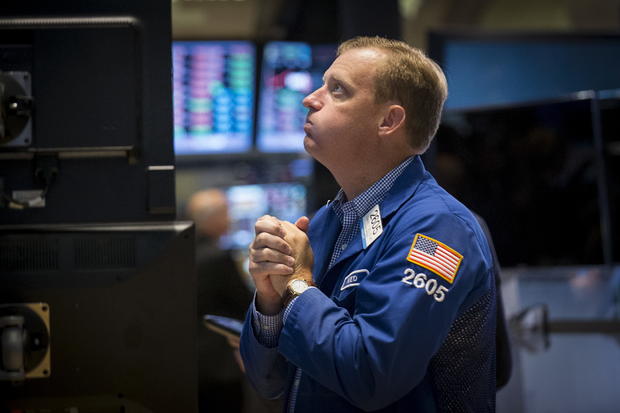Asian stocks slump again; U.S. markets look set to follow
TOKYO - U.S. investors may be in for another wild ride.
Stock index futures plunged on Monday after Chinese shares fell 8.5 percent, their biggest drop since before the financial crisis. The plunge, which risks pushing U.S. indexes into correction territory, is heightening concerns about a slowdown in global economic growth.
"The steep selloff in global markets has been triggered by concerns over Chinese economic slowing, with markets now beginning to question whether the global rout will directly impact the US economy," said Gennadiy Goldberg, U.S. strategist with TD Securities, in a note. "While direct spillover impact remains somewhat limited, investors are taking few chances as volatility spills across national boundaries."
U.S. financial markets last week suffered their biggest decline since 2011, with the Dow industrials (DJI) falling 531 points, or 3.1 percent, to 16,460, leaving it down 10 percent from its May high. The S&P 500 and Nasdaq composite also fell sharply, as domestic stocks joined a global rout in equities.
The Shanghai index suffered its biggest percentage decline since February 2007, with many China-listed companies hitting their 10 percent downside limits. The benchmark closed at 3,209.91 points, meaning it has lost all of its gains for 2015, though it is still more than 40 percent above its level a year ago.
China's dimming outlook is drawing calls for more economic stimulus from Beijing, though earlier government efforts to staunch the hemorrhage appear to have done little to stabilize markets.
Asia's gloom spread to European markets, where Britain's FTSE 100 fell 2.7 percent, Germany's DAX 2.6 percent and the CAC 40 of France 2.5 percent. Dow futures were down over 2 percent while the S&P futures were 1.8 percent lower.
Japan's Nikkei fell 4.6 percent to 18,540.68, its worst one-day drop since in over two and a half years.
"It is a key moment for China. The equity market in free fall, the banking system increasingly starved of liquidity, rising capital outflows, and a rapidly slowing economy," Angus Nicholson, a market analyst for IG, said in a market note.
"Global markets look set to continue their rout into the European and U.S. sessions," he said, noting that the scale of the losses may have been exaggerated by the thin trading volumes typical of late August.
The price of commodities has taken a particular beating. Benchmark U.S. crude oil fell to just above $39 a barrel, while the dollar is declined against the yen.
Some analysts say they see opportunities for bargains in the latest plunge in prices. But underlying the gloom is the growing conviction that policymakers and regulators may lack the means to staunch the losses.
The bloodletting spread across Asia, as Hong Kong's Hang Seng index fell 5.2 percent to 21,251.57. Australia's S&P ASX/200 slid 4.1 percent to 5,001.30, while South Korea's Kospi lost 2.5 percent to 1,829.81.
Those declines followed tumbles over the weekend in emerging markets such as Egypt, Dubai and Saudi Arabia.
Fresh evidence of the slowdown in China's economy sparked a wave of selling Friday in Europe and the U.S. that culminated with the S&P 500 losing nearly 6 percent for the week in its worst weekly slump since 2011.
The panic has underscored the scale of the challenge for Chinese leaders in seeking to curb excess investment and guide the economy toward a more sustainable pace of growth.
"My biggest concern is that global growth momentum is very fragile. The most important step is to see China take further action to try to bring their economy to a 7 percent growth path," said Rajiv Biswas, Asia-Pacific chief economist for IHS.
In currency trading, the dollar was at 120.65 yen on Monday, down from 122.05 yen on Friday. The euro rose to $1.1462 from $1.1388. Currencies fell hard in developing economies - particularly those that rely heavily on the export of commodities and oil, both of which China is a big consumer. The Russian ruble dropped 2.3 percent to a seven-year low.
In commodity markets, benchmark U.S. crude dropped $1.67 to $38.78 a barrel in electronic trading on the New York Mercantile Exchange. It fell 87 cents a barrel on Friday. Brent crude, a benchmark for international oils used by many U.S. refineries, fell $2.07 to $43.39 a barrel.
